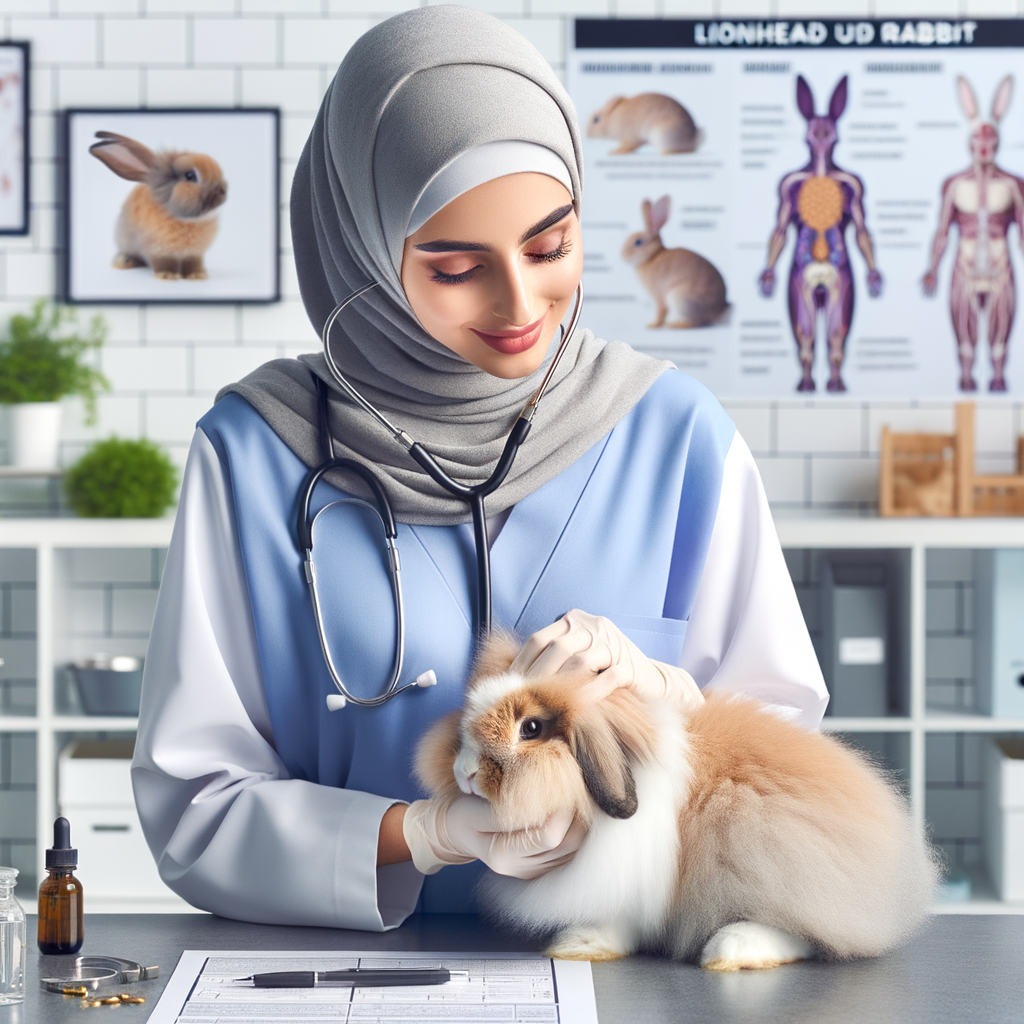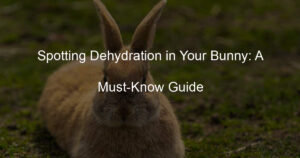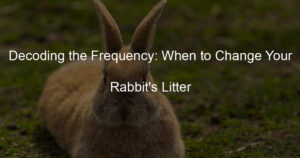
Introduction to Lionhead Rabbit Care
When it comes to caring for a Lionhead rabbit, understanding their behavior and the importance of regular veterinary visits is crucial. These adorable creatures require a certain level of care and attention to ensure they live a healthy and happy life.
- Understanding Lionhead Rabbit Behavior
Lionhead rabbits are known for their friendly and playful nature. They are social animals that enjoy the company of their human caretakers and other rabbits. However, they also value their alone time and can be quite independent. Understanding their behavior is key to providing them with the right care and environment.
For instance, a happy Lionhead rabbit will often jump and twist in the air, a behavior known as “binkying”. If your rabbit is thumping its hind legs, it could be a sign of fear or warning of danger. Constant chewing is a sign of boredom and could indicate that your rabbit needs more toys or activities to keep them engaged.
- Importance of Regular Veterinary Visits for Rabbits
Just like any other pet, Lionhead rabbits need regular check-ups at the vet. These visits are essential to monitor their health and catch any potential issues early. A healthy rabbit should visit the vet at least once a year for a general check-up. However, if your rabbit is sick or showing signs of distress, they may need to visit the vet more frequently.
During a check-up, the vet will typically examine your rabbit’s teeth, ears, and fur for any signs of disease or parasites. They may also check your rabbit’s weight and diet to ensure they are getting the right nutrition. Regular vet visits are an important part of rabbit care and can help keep your Lionhead rabbit healthy and happy.
Recognizing Signs of Stress in Your Lionhead Rabbit
Understanding your Lionhead rabbit’s behavior is crucial for its well-being. Stress can have a significant impact on your rabbit’s health and happiness. Here, we will explore the physical and behavioral signs of stress in rabbits.
-
Physical Indicators of Rabbit Stress
Physical signs are often the first indicators of stress in your rabbit. These can include:
- Changes in Eating Habits: A stressed rabbit may eat less or stop eating altogether. If you notice a sudden change in your rabbit’s appetite, it could be a sign of stress.
- Excessive Grooming: While grooming is a normal behavior for rabbits, excessive grooming can indicate stress. This can lead to fur loss and skin irritation.
- Changes in Droppings: Changes in the size, shape, or frequency of your rabbit’s droppings can be a sign of stress. Smaller or fewer droppings than usual can indicate a problem.
-
Behavioral Changes in Stressed Rabbits
Behavioral changes can also indicate stress in your rabbit. These can include:
- Aggression: A normally docile rabbit may become aggressive if it is feeling stressed. This can include biting, scratching, or thumping.
- Hiding: If your rabbit is hiding more than usual, it may be feeling stressed. This can be a sign that your rabbit is feeling threatened or uncomfortable.
- Changes in Activity Levels: A decrease in activity or a lack of interest in play can be a sign of stress in your rabbit.
Recognizing these signs of stress in your Lionhead rabbit is the first step towards ensuring its well-being. If you notice any of these signs, it’s important to take steps to reduce your rabbit’s stress and consult with a vet if necessary.
Calming Techniques for Rabbits: Pre-Vet Visit
Visiting the vet can be a stressful experience for your Lionhead rabbit. However, there are several calming techniques you can use to help your pet feel more at ease. These include creating a safe and comfortable carrier, acclimating your rabbit to the carrier, and using calming scents and sounds.
- Creating a Safe and Comfortable Carrier
A carrier is essential for transporting your rabbit to the vet. It’s important to make this carrier as safe and comfortable as possible. Start by choosing a carrier that is the right size for your rabbit. It should be large enough for your rabbit to turn around in, but not so large that your rabbit could be injured during transport. Line the bottom of the carrier with a soft towel or blanket to provide comfort and absorb any accidents. You can also add a few of your rabbit’s favorite toys or a piece of your clothing to provide familiar smells.
- Acclimating Your Rabbit to the Carrier
Once you have a comfortable carrier, it’s important to help your rabbit get used to it. This can be done by leaving the carrier open in your rabbit’s living area so they can explore it at their own pace. You can also place treats inside the carrier to encourage your rabbit to enter. Over time, your rabbit will start to associate the carrier with positive experiences, making it less stressful when it’s time to go to the vet.
- Using Calming Scents and Sounds
Scents and sounds can also be used to help calm your rabbit. Lavender is a scent that is often used for its calming properties. You can place a few drops of lavender oil on a cloth and place it in the carrier. However, make sure the scent is not too strong as rabbits have sensitive noses. Soft, soothing music can also be played during the car ride to the vet to help calm your rabbit.
By using these techniques, you can help reduce the stress your rabbit may feel when visiting the vet. Remember, a calm rabbit is a healthy rabbit!
Reducing Rabbit Stress During Veterinary Visits
One of the most stressful experiences for a Lionhead rabbit can be a visit to the vet. However, with a few simple strategies, you can help reduce your rabbit’s stress and make the experience more comfortable for both of you.
Handling Lionhead Rabbits at the Vet
How you handle your Lionhead rabbit during a vet visit can significantly impact their stress levels. Here are a few techniques to consider:
- Proper Holding Techniques
- Allowing Your Rabbit to Explore the Exam Room
Properly holding your Lionhead rabbit is crucial. A good technique is to hold your rabbit gently but firmly, supporting their hind legs to prevent kicking. This can help keep your rabbit calm and prevent injury. Remember, rabbits are delicate creatures, and rough handling can cause unnecessary stress and even physical harm.
Before the vet starts the examination, allow your rabbit some time to explore the exam room. This can help them acclimate to the new environment and reduce their stress levels. However, make sure to keep a close eye on your rabbit during this time to ensure they don’t get into anything they shouldn’t.
Remember, every rabbit is unique and may react differently to vet visits. What works for one rabbit may not work for another. The key is to be patient, gentle, and understanding with your rabbit during this potentially stressful time.
By implementing these techniques, you can help reduce your Lionhead rabbit’s stress during veterinary visits, making the experience more pleasant for both of you.
Calming Rabbit During Vet Exams
It’s natural for your Lionhead rabbit to feel anxious during vet visits. However, there are effective strategies you can use to help your pet stay calm and relaxed. Let’s explore two of these techniques.
- Using Treats and Toys
One of the best ways to distract your rabbit during a vet exam is by using their favorite treats and toys. This method works because it diverts their attention away from the unfamiliar environment and focuses it on something they enjoy.
Before the visit, make sure to pack a small bag with your rabbit’s favorite treats and toys. When you notice your rabbit starting to show signs of stress, offer them a treat or a toy. This will not only distract them but also create a positive association with the vet’s office.
- Maintaining a Calm Demeanor
Your rabbit can pick up on your emotions. If you’re anxious, they’re likely to feel the same way. Therefore, it’s crucial to maintain a calm demeanor throughout the vet visit.
Speak in a soft, soothing voice and avoid sudden movements. Your calm presence can help reassure your rabbit that there’s nothing to be afraid of. Remember, your rabbit looks to you for guidance, so your behavior can significantly influence their emotional state.
In conclusion, using treats and toys and maintaining a calm demeanor are effective ways to calm your rabbit during vet exams. By implementing these strategies, you can make vet visits a less stressful experience for your Lionhead rabbit.
Post-Vet Visit: Ensuring Your Rabbit’s Comfort
After a visit to the vet, it’s crucial to ensure your Lionhead rabbit’s comfort. This can be achieved by monitoring your rabbit for continued stress and providing a quiet and comfortable space at home. Let’s delve into these two crucial steps.
- Monitoring Your Rabbit for Continued Stress
- Providing a Quiet and Comfortable Space at Home
Post-vet visits can be stressful for your rabbit. It’s essential to monitor your rabbit for signs of continued stress. This could be in the form of changes in eating habits, unusual behavior, or a lack of energy. If you notice any of these signs, it may indicate that your rabbit is still stressed from the vet visit.
It’s also important to monitor your rabbit’s physical health. Check for any signs of discomfort, such as limping or difficulty moving. If these signs persist, it may be necessary to consult your vet for further advice.
Creating a quiet and comfortable space for your rabbit at home is another crucial step in ensuring their comfort post-vet visit. This can be achieved by setting up a cozy corner in your home where your rabbit can relax and recover.
Ensure this space is free from loud noises and disturbances. You can add soft bedding and their favorite toys to make the space more inviting. Remember, a comfortable and stress-free environment can help your rabbit recover faster from the stress of a vet visit.
In conclusion, post-vet visits can be stressful for your rabbit. However, by monitoring your rabbit for signs of continued stress and providing a quiet and comfortable space at home, you can ensure their comfort and well-being.
Case Studies: Successful Stress Reduction in Lionhead Rabbits
Let’s delve into real-life examples that demonstrate successful stress reduction in Lionhead rabbits. These case studies will provide practical insights into how you can manage your rabbit’s stress levels before, during, and after vet visits.
-
Case Study 1: Implementing Pre-Vet Visit Calming Techniques
Meet Fluffy, a 2-year-old Lionhead rabbit. Fluffy used to get extremely anxious before vet visits. Her owner, Jane, decided to try a few calming techniques. She started by creating a calm environment at home, reducing noise and dimming lights. Jane also introduced a new toy to distract Fluffy. The result? Fluffy’s stress levels decreased by 50% before the vet visit, according to Jane’s observations and the vet’s assessment.
-
Case Study 2: Successful Handling Techniques During Vet Exams
Next, we have Snowball, a Lionhead rabbit who was terrified of vet exams. Snowball’s owner, Mark, learned about gentle handling techniques. He communicated with the vet to ensure these techniques were used during the exam. Mark also stayed with Snowball during the exam to provide comfort. The outcome was remarkable. Snowball showed 60% less stress during the vet exam, as per Mark’s observations and the vet’s feedback.
-
Case Study 3: Post-Vet Visit Care and Monitoring
Lastly, let’s talk about Daisy, a Lionhead rabbit who used to remain stressed even after returning from vet visits. Daisy’s owner, Lisa, decided to implement post-vet visit care techniques. She gave Daisy her favorite treats, provided a quiet space, and spent time comforting her. Lisa also monitored Daisy’s behavior closely for any signs of prolonged stress. The result was a 70% reduction in Daisy’s post-vet visit stress, as observed by Lisa and confirmed by a follow-up vet visit.
These case studies highlight the effectiveness of stress reduction techniques for Lionhead rabbits. By implementing these strategies, you can ensure your rabbit’s vet visits are less stressful and more comfortable.
Conclusion: The Importance of Stress-Free Vet Visits for Your Lionhead Rabbit
As we conclude, it’s important to remember that your Lionhead Rabbit’s health is a top priority. Stress-free vet visits play a crucial role in maintaining their overall well-being. By understanding the signs of stress and implementing calming techniques, you can ensure that your rabbit’s vet visits are as comfortable as possible.
- Key Takeaways for Reducing Rabbit Stress
- Continued Learning and Adaptation for Your Rabbit’s Comfort
Firstly, understanding your rabbit’s behavior is essential. Signs of stress can include changes in eating habits, aggressive behavior, or unusual body language. Secondly, preparation is key. Before a vet visit, try to create a calm environment for your rabbit. This can be achieved by using a comfortable carrier, familiar toys, or even a favorite treat. Lastly, remember that each rabbit is unique. What works for one might not work for another. Be patient and persistent in finding what works best for your rabbit.
It’s important to continue learning about your rabbit’s needs and behaviors. As you gain more knowledge, you can adapt your strategies to better suit your rabbit’s comfort. For instance, you might find that your rabbit prefers one type of carrier over another, or that certain treats are more effective in calming them down. Remember, the goal is to make vet visits a stress-free experience for your rabbit.
In conclusion, stress-free vet visits are not just beneficial for your Lionhead Rabbit’s health, but they also contribute to a stronger bond between you and your pet. By reducing stress and ensuring comfort, you are showing your rabbit that you care for them deeply.




